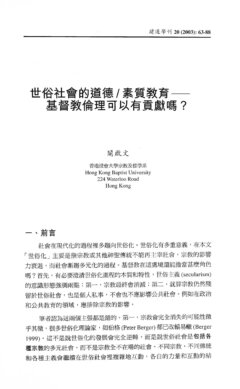世俗社會的道德/素質教育──基督教倫理可以有貢獻嗎?/關啟文
撮要
社會在現代化的過程裡多趨向世俗化,宗教或其他神聖傳統不能再主宰社會,宗教的影響力衰退,社會漸趨多元化,基督教在這處境還能擔當甚麼角色嗎?在本文,筆者先指出澄清這種世俗化進程的本質和特性之必要,世俗主義(secularism)的意識形態強調兩點:第一,宗教最終會消滅;第二,就算宗教仍然殘留於世俗社會,也是個人私事,不會也不應影響公共社會,例如在政治和公共教育的領域,應排除宗教的影響。
筆者認為這兩個主張都是錯謬的。第一,宗教會完全消失的可能性微乎其微,很多世俗化理論家,如伯格(Peter Berger)都已改轄易轍。這不是說世俗化的發展會完全逆轉,而是說世俗社會是包括各種宗教的多元社會,而不是宗教全不在場的社會。不同宗教、不同傳統和各種主義會繼續在世俗社會中複雜地互動,各自的力量和互動的結果,在不同時間和地方可以大大不同,不能一概而論。總而言之,宗教(如基督教)能在某些地方興盛並對社會發生影響力,是不能抹殺的。
第二,排斥宗教對公共領域的影響的立場,不單是霸權,也不一定有利於世俗社會,筆者以道德教育為例論證這點。正因為世俗社會放棄了有社會共識的宗教或傳統,在公共領域的道德教育更形逼切。然而,純粹世俗主義的倫理(secularist ethics) ,把「排斥宗教」當作教條,最後很難為道德的基礎和關注提供堅實的支持和豐富的資源。對比起來,基督教倫理為人的尊嚴和平等、人類大家庭的概念提供穩固基礎,對道德實踐和道德教育也提供獨特的資源。因此,縱使在世俗社會中,基督教倫理這多元精神傳統的一元,仍能對道德教育有所貢獻。
ABSTRACT
During the modernization of societies, there will often be trends of secularization: religion or other sacred traditions can no longer dominate the society; the influence of religion tends to decline; the society becomes more and more pluralistic, and so on. In such a situation, what social roles can Christianity still assume? In this paper,I will first point out the need to clarify the nature and characteristics of the secularization process. The ideology of secularism emphasizes two points. First, religion in the long run will disappear. Second, even if vestiges of religion still linger on in the secular society, religion is only a private matter. It cannot and should not influence the public realm. So, for example, we should exclude the influence of religion in the realms of politics and public education.
I think these two claims are erroneous. First, that religion will completely disappear is very unlikely. Many secularization theorists, e.g., Peter Berger, have changed the mind. Although the process of secularization may not be completely reversed, a secular society does not mean a society without religion. Instead it is a pluralistic society which includes religions of many kinds. Different religions, different traditions and various kinds of secularism will continue to interact in a complicated manner in a secular society. Their respective strengths and the consequence of interaction will vary with time and space. It is difficult to generalize. It is a real possibility that a religion like Christianity will flourish in a society and exerts influence on it.
Second, the proposal to banish religion from the public realm not only exhibits a kind of hegemony, but may also prove detrimental to the society. I will use moral education as an example to argue this point. Exactly because the secular society abandons a religion or tradition which can command consensus, moral education in the public realm becomes an even more urgent issue. Secularism’s basic tenet excludes religion or transcendence. It is difficult to provide a solid foundation and rich resources for morality. In contrast, Christian ethics provide a solid foundation for human dignity, equality and the solidarity of humankind. It also provides unique resources for moral practice and moral education. This shows that even in a secular society, Christian ethics can still contribute to moral education.
原載於《建道學刊》20期(2003年7月),頁63-88。







